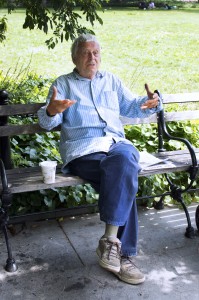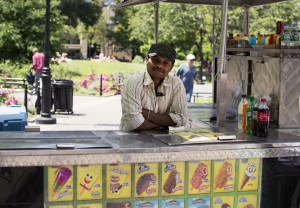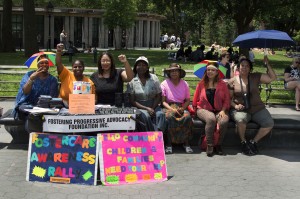New York City contains an enormous variety of people. Some love it; some hate it. Some struggle to get by, and others live with few concerns for their everyday survival. We (Julia and Rachel) were inspired to connect with people in the community right outside our front door. Washington Square Park is an oasis for people to play street music, read books, play chess, sell food, admire the arch built in honor of George Washington, and listen to children squeal while running through a water fountain. People from all walks of life come here to enjoy the square that used to form the center stage for bohemian folk singers during the Beatnik Riot. We came away with a new connection to the city by interviewing and photographing seven individuals and groups, reflecting on life in New York, feminism, and the social movements.
This man has lived in the city since 1964, and has witnessed many of the changes New York has seen. He used to live in Canada, working as a film editor for TV shows and movies. With the help of a caretaker, he gladly answered our questions and told us about his life.
What gives you hope?
“The day to day things, basically. You have no choice, basically – you keep the hope or you’re out.”
What would your ideal society look like?
“It would have to be a democracy. No religion at all. I wouldn’t force it, but I would hope it would fade away. Because to me, religion has been the great curse of mankind. Oceans of blood have been spilled by religious wars so it would have to be rational. As it continues, it will change.”
Enjoying her peaceful weekend off from work, this woman described her feelings of living in a hectic city.
What gives you hope?
“The sun.”
What do you think is the biggest problem that New York City faces?
“People work too much. They forget to live.”
This was his first day on the job at an ice cream cart in the park; previously, he had worked at one in Central Park. His boss owns all of the yellow carts you see around the city. Although humorous, he describes real fears he and his family face living in New York City.
What do you think is the biggest problem that New York City faces?
“It’s my concern, for the job or for the housing. I live with my wife and my baby, and I pay $1100 in rent. If I’m single, it doesn’t matter. But if you have a family, everything goes into housing. I applied for city housing. It’s been 3 years, and no response. Every time I call, nothing.”
What would your ideal society look like?
“There’s a little park, there’s a community board, a school, and housing project – cheaper than now. If you make $1200 a month, rent shouldn’t be more than $500 a month. If it’s $800, $900, how are you going to pay for your coat? Your food? Your baby’s Pampers? I have a baby now, and my wife is pregnant, and I’m terrified for when it comes. I applied for food stamps and filled out all the paperwork and they got back to me and asked, “You have another child on the way. How are you going to pay for that?” Like, you have this pen and paper. I don’t ask you how you got it. That’s insulting. You have it, it’s yours.”
We saw this group of four friends sitting on a sunny spot of ground. The two men were Italian, the woman on the far right was British, and the woman second from the left was from the U.S. Both women conduct research in physics, a male dominated field. They had an easy friendship, talking and laughing as they enjoyed a beautiful Sunday morning.
What gives you purpose?
After one of them replied with “Love,” they all agreed on this question.
What comes to mind when you hear the word feminism?
Woman towards the left: “Independence.”
Woman on the right: “Equality.”
Man toward the right: “I try to support feminism in my own world. I try to treat my girlfriend [left] even better than I treat myself. This world is hard for women, so I try to make her life easier in that regard. Not that she needs it – she’s very independent.”
Woman toward the left: “We both (refers to woman on the right) work in a male dominated area of research [physics], so I spend time with other female postdocs discussing these kinds of issues.
Woman on the right: “It gets worse as you get further along. In my masters, there were 250 of us – male and female – and 10 were female.”
If you could start any social movement, what would it be for?
Woman on the right: “The right for anyone to be who they want to be without discrimination.”
Woman toward the left: “Clean water and toilets – it would seriously reduce the amount of sexual violence towards women. It’s an especially big problem in India.”
Man toward the right: “I would increase the culture about food. Most health issues come from bad eating habits. And the rich people can afford to eat well because healthy food is more expensive than fast food. But then we’re punishing the poor.”
A chess player and a photographer reminisced about the former state of the park, when music filled the entire park, people could “get anything”, and the park was open all night for everyone. Both discussed problems in New York, rising college tuitions, and the inconsistencies in police punishments.
What’s the strangest thing that’s ever happened to you?
Man (on the right): “I was shot at 13 going to get medicine for my grandma. From Lexington to Madison, I never made it. It was April 30th, 1969. My arm went real heavy. I was like, I think I’m shot! Everyone started going Ahhh, Ahhh. I was shot. My arm felt like someone yanked my arm, and then I saw blood. That was traumatic.”
Man (on the left): “I was running on the roof of a factory. We were playing tag. I was a kid, a teenager, about 13. Next thing I know, I woke up in the hospital. I fell through.”
Man (R): “God was looking out for you. He said, Imma give you give you another chance, fool!”
What is New York’s biggest problem?
Man (L): “Police. I mean if you’re wrong you’re wrong, but you’ve got cops picking people up for small things while murderers walk around the city like nothing’s wrong. And they don’t get investigated like people do for having an open beer.”
Man (R): “Profiling business. It’s like you’re guilty before anything else happens.”
Man (L): “I like change, but I believe that New York is now a police state.”
Man (R): “$30,000 turned into $70,000 in loans. Sold myself to student loans.”
This saxophone player practices every Sunday with his jazz band Rasheed and the Jazz Collective in Washington Square Park. He also owns a jazz club in Queens, which is called the Jackson Room jazz club. For some street musicians this would form a means for survival, but for him it is a therapeutic way to practice in a pleasant environment.
If you could create your ideal society, what would it look like?
“I think a lot about what I would do if I were president. I would make it mandatory for people like you, a condition of you graduating, to travel somewhere outside of the U.S. As musicians, we’ve all seen the world. It broadens your horizons. If people checked other cultures, there would be a lot less problems in the world.”
These two women (second and third from the left) founded an advocacy activist organization under the name of FPA Foundation in 2008. Both are former foster youth and currently foster and adoptive parents, and realized they wanted to “foster youths and organize parents around injustices” experienced with the child welfare system. (http://www.fpafoundation.org/index.html)
“I had great adoptive parents. And we really filled a niche – there is a dire situation. We’ve made a name for ourselves in the past 6 years and had a positive effect. We’re grassroots, so we can shake things up.”
The women organize awareness protest rallies in all 5 boroughs to challenge foster care agencies, such as ACS and other family court. Along with raising awareness, they have put pressure on the mayor and hold agents accountable. In their path to equality they describe how women have to become involved in the movement in order to make change.
“As women, we have to fight for the children. We have a lot of power. More women need to get involved. I think women have a lot of talents that have just been swept under the rug.”
__________________________________________
We live in a world where a select number of opinions are heard; many do not have the privilege for their voices to be acknowledged. We cannot forget that the inhabitants of cities and nations collectively can convey wisdom and knowledge about the practical application of laws and ideologies that politicians, non-profits, and other organizations often forget to take into account. Art forms such as street photography function as a way to hear the voices of Washington Square Park, a small dot on the map of New York City.







